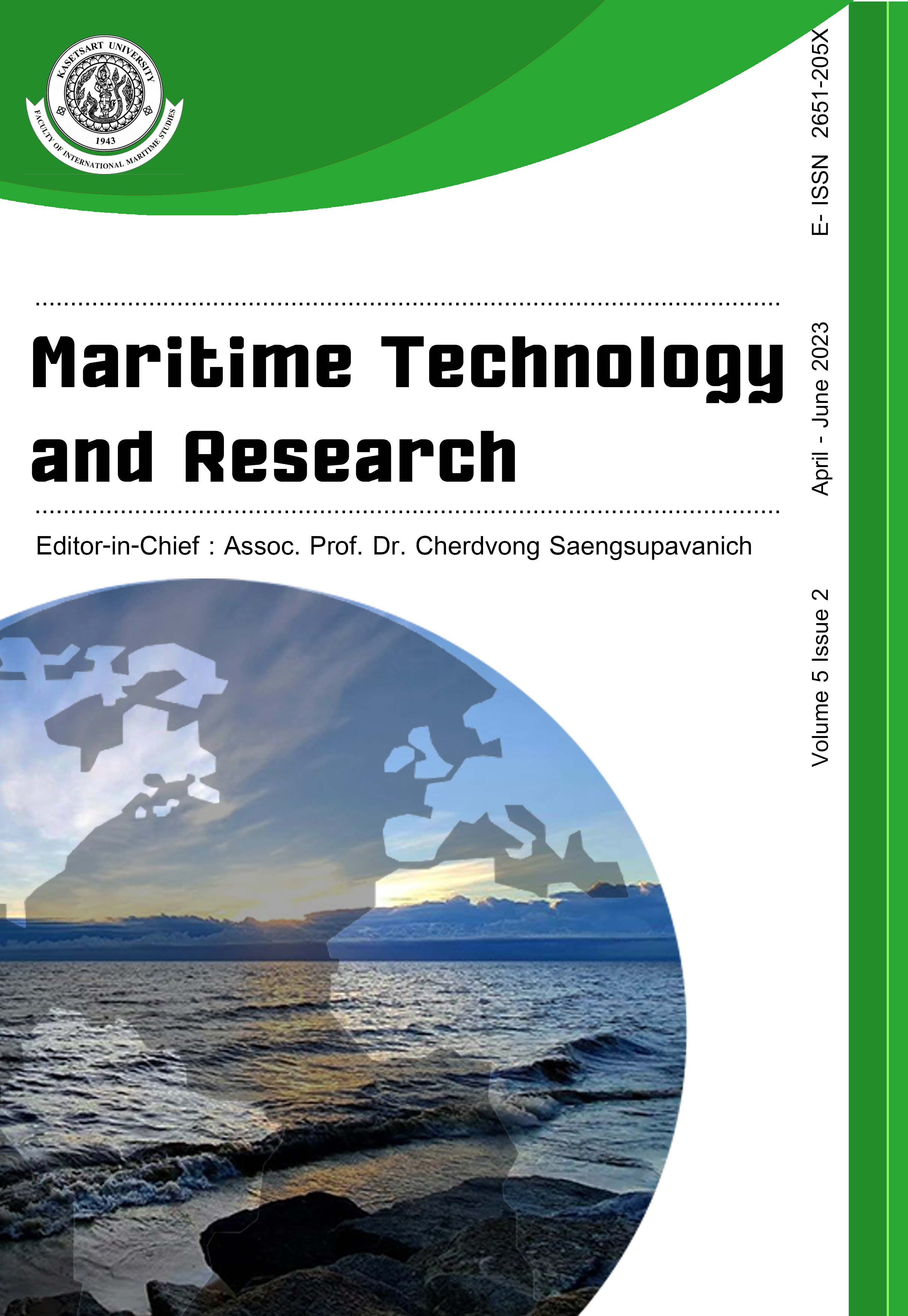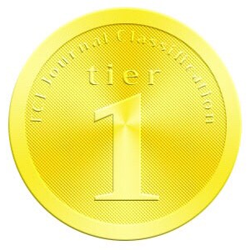Modeling shipping accidents economic loss and the compensation in Nigeria
DOI:
https://doi.org/10.33175/mtr.2023.260960Keywords:
Compensation, Shipping accidents, Economic loss, Claims, Marine insuranceAbstract
The arbitrary reservation of between 25 and 45 % of premium revenue as funds for the compensation of insured unexpired marine risks by underwriters in Nigeria, in line with local insurance regulations, has created a problem of financial insolvency, making it impossible for underwriters to provide timely and adequate compensation for insured shipping risks. The aim of the study is to overcome this challenge by formulating models based on the coefficient of elasticity of the relationships between shipping accident economic loss, the value of seaborne trade, and compensation funds maintained for insured shipping risks. 21 years of time series data from 1999 and 2019 were obtained from secondary sources. Log-log constant elasticity model was used to analyze the data. The results indicate that, for each 1 % increase in shipping accident economic loss, compensation funds maintained for shipping accident economic risks increase by 0.364 %. The policy implications are discussed and models developed for the reservation of funds for sustainable compensation of insured shipping risks are developed.
------------------------------------------------------------------------------
Cite this article:APA Style:
Nwokedi, T.C., Ndikom, O.B., Nnadi, K.U., & Onyemechi, C. (2023). Modeling shipping accidents economic loss and the compensation in Nigeria. Maritime Technology and Research, 5(2), 260960. https://doi.org/10.33175/mtr.2023.260960
MDPI Style:
Nwokedi, T.C.; Ndikom, O.B.; Nnadi, K.U.; Onyemechi, C. Modeling shipping accidents economic loss and the compensation in Nigeria. Marit. Technol. Res. 2023, 5(2), 260960. https://doi.org/10.33175/mtr.2023.260960
Vancouver Style:
Nwokedi TC, Ndikom OB, Nnadi KU, Onyemechi C. (2023). Modeling shipping accidents economic loss and the compensation in Nigeria. Marit. Technol. Res. 5(2): 260960. https://doi.org/10.33175/mtr.2023.260960
------------------------------------------------------------------------------
References
Adegbayi, A. (2017). It’s cheaper to have marine insurance than get fined. Retrieved from http://www.vanguardnewsonline.com
Adekunbi, I., & Nzeribe, A. (2013). Compensation of oil spill victims in Nigeria: The more the oil, the more the blood? Singaporean Journal of Business Economics, and Management Studies, 2(3), 30-43. https://doi.org/10.12816/0003859
Aderemo, A. J. (2012). Road traffic accident injuries and productivity in Nigeria. Journal of Asian Scientific Research, 2(7), 334-344.
Allianz. (2014). Safety and shipping 1912-2012. Retrieved from http://www.ages.allianz.com
Ando, A.W. (2004). Natural resource damage assessment methods and cases, WMRC’s research report series. Retrieved from http://www.wrurc.uiuc.edu
Babawale, G. K. (2013). Emerging issues in compensation valuation for oil spillage in the Niger Delta Area of Nigeria. Journal of Reviews on Global Economics, 2013(2), 31-45. https://doi.org/10.6000/1929-7092.2013.02.4
Bello, O. M., & Olukolajo, M. A. (2016). Adequate compensation as a tool for conflict resolution in oil-polluted wetlands of Niger Delta Region of Nigeria. Covenant University Journal of Politics & Internationall Affairs, 4(2), 38-49.
CBN. (2013). Central Bank of Nigeria Statistical Bulletin. 2013th eds. Central Bank of Nigeria.
CBN. (2018). Central Bank of Nigeria Statistical Bulletin. 2018th eds. Central Bank of Nigeria.
Chima, J. (2011). Arbitration as a conflict resolution approach to oil spill compensation payment in oil producing Communities of rivers state, Nigeria. International Journal of Advanced Legal Studies and Governance, 2(1), 17-32.
Demarco, G., Rob, F., & Thomas, A. (1997). The economic impacts of accident on the marine industry, prepared for the U.S. coast guard. Standards Evaluation and Development Division, Washington, DC.
Flyvbjerg, B., & Budzier, A. (2011). Why your project may be riskier than you think. Harvard Business Review, 89(9), 601-603. https://doi.org/10.2139/ssrn.2229735
Gujarati, D. N., & Porter, D. C. (2009). Basic Econometrics. 5th eds. New York, McGraw-Hill/Irwin.
International Labour Organization. (2006). Maritime labour convention, 2006. Retrieved from http://www.ilo.org
International Monetary Fund. (2013). Nigeria: Publication of financial sector assessment program documentation-Detailed assessment of observance of insurance core principles. Retrieved from: http://www.imf.org
ISO. (2009). Risk management: Principles and guidelines on implementation. International Standard organization, Document No. 31000-2009.
Lame, T. (2008). Book review of HMS Conway 1859-1974 by Alfine window. International Journal of Maritime History, 21(2), 383-400. https://doi.org/10.1177/084387140902100237
MAIB. (2008). Annual statistical report of the marine accident investigation boards. Retrieved from http://www.amem.at
NBS. (2014). National Bureau for Statistics, Annual Statistical Report. National Bureau for Statistics. 2014th eds.
NIA. (2007). The Nigeria Insurance Act. Nigeria.
NIA. (2017). Insurance digest. Annual Statistical Publication of the Nigerian Insurers Association. Lagos, NIA.
NPA. (2014). Nigeria ports authority annual statistical bulletin. 2014th eds. Nigeria Ports Authority.
Nwokedi, T. C. (2021). Modeling marine accidents economic loss and the compensation in Nigeria (Ph.D. Thesis). Department of Maritime Management Technology, Federal University of Technology, Owerri, Nigeria.
Nwokedi, T. C., Ibe, C., Okeudo, G., & Moses, N. (2017). Analysis of vessel-based marine accidents and the economic risks to Nigeria. Journal of Water Resources and Ocean Science, 6(6), 72-84. https://doi.org/10.11648/j.wros.20170606.11
Nwokedi, T. C., Okoroji, L. I., & Onyemechi, C. (2014). An analysis for reduction in economic loss from damage accident in use of transport modes: A comparative study. Journal of Economics and Sustainable Development, 5(28), 182-189.
Nwokoro, I. A., & Nwokedi, T. C. (2015) An evaluation of the economic and financial capacity of indigenous underwriting firms for marine risk and investment cover in Nigeria. International Journal of Research in Commerce, IT and Management, 5(3), 62-66.
Nzeribe, E. A. (2019). Maritime claims subject to liability limitation in Nigeria: The legal framework. Journal of Current Research, 11(8), 6347-6350.
Olukolajo, M. A. (2017). Monetary compensation for oil spill damage in Niger Delta Region, Nigeria: A question of adequacy. Oil and Gas Business, 2017(5), 138-154. https://doi.org/10.17122/ogbus-2017-5-138-154
Onuoha, R. (2019). Insurers battle shipowners over maritime insurance. Retrieved from http://www.vangaurdnewsonline
Robert, S., & Williams, J. (2007). Update on mortality for workers in the UK merchant shipping and fishing sectors (p. 56). Report for the Maritime and Coastguard Agency and the Department of Transport. MCGA Research Project.
Susan, H. (2001). Law of marine insurance (pp. 323-326). Cavendish Publishing.
The International Union of Marine Insurance. (2011). Annual statistical report of the international union of marine insurance. Retrieved from http://iumu.com./statistics/2011
The International Union of Marine Insurance. (2018). Annual statistical report of the International Union of Marine Insurance (IUMI). Retrieved from http://iumu.com./statistics/2011
Trevisani, D. (2007). The direction of change. Milan, Franco Angeli.
Tyne, K. (2012). An introduction to P&I insurance and loss prevention. 2nd eds. North of England P&I Association.
UNCTAD. (2014). Review of maritime transport. Annual Publication of the United Nations Conference on Trade and Development.
Yan, F. W., Min, X., Kwai-Sang, C., & Xiu, J. (2013). Accident analysis model based on Bayelsian Network and evidential reasoning approach. Journal of Loss Prevention in the Process Industries, 26(1), 10-21. https://doi.org/10.1016/j.jlp.2012.08.001
Zaloshuja, E., Ted, M., & Waehrer, G. (2006). Impact of occupational injury reduction on the US economy. American Journal of Industrial Medicine, 49(9), 709-798. https://doi.org/10.1002/ajim.20353
Downloads
Published
Issue
Section
License
Copyright (c) 2022 Maritime Technology and Research

This work is licensed under a Creative Commons Attribution-NonCommercial-NoDerivatives 4.0 International License.
Copyright: CC BY-NC-ND 4.0








